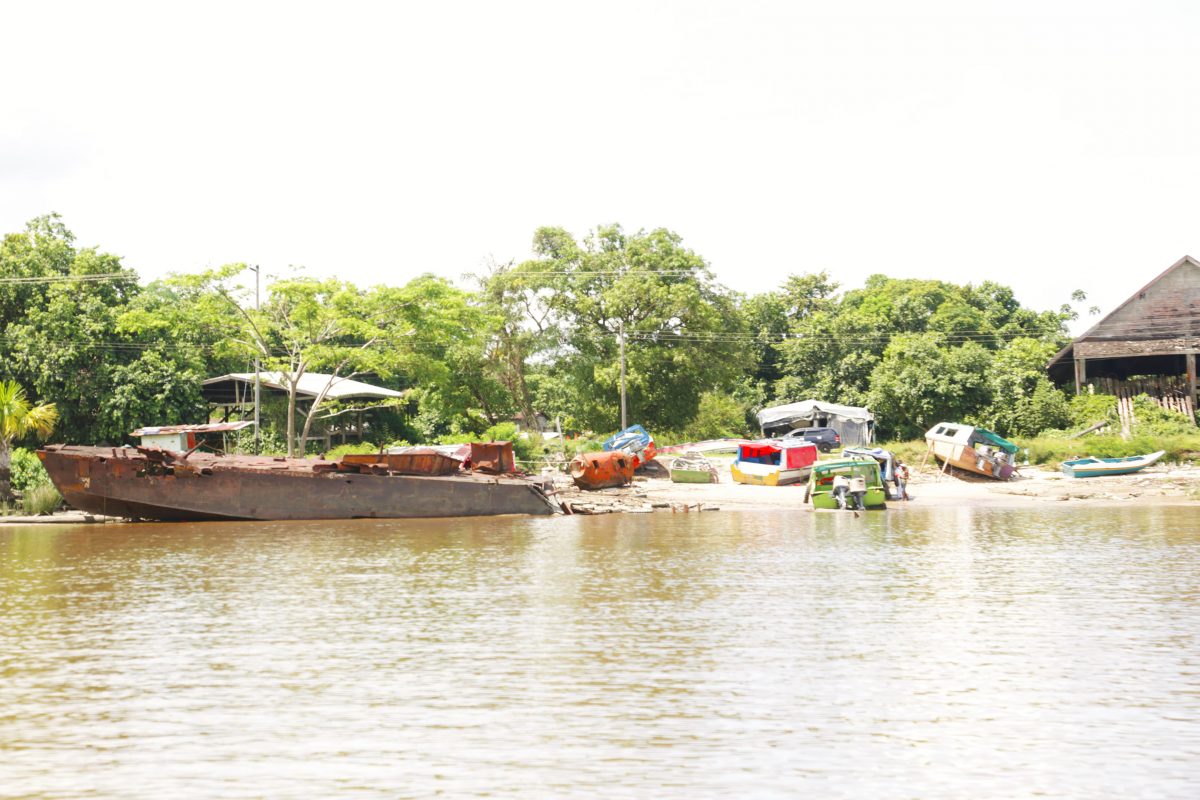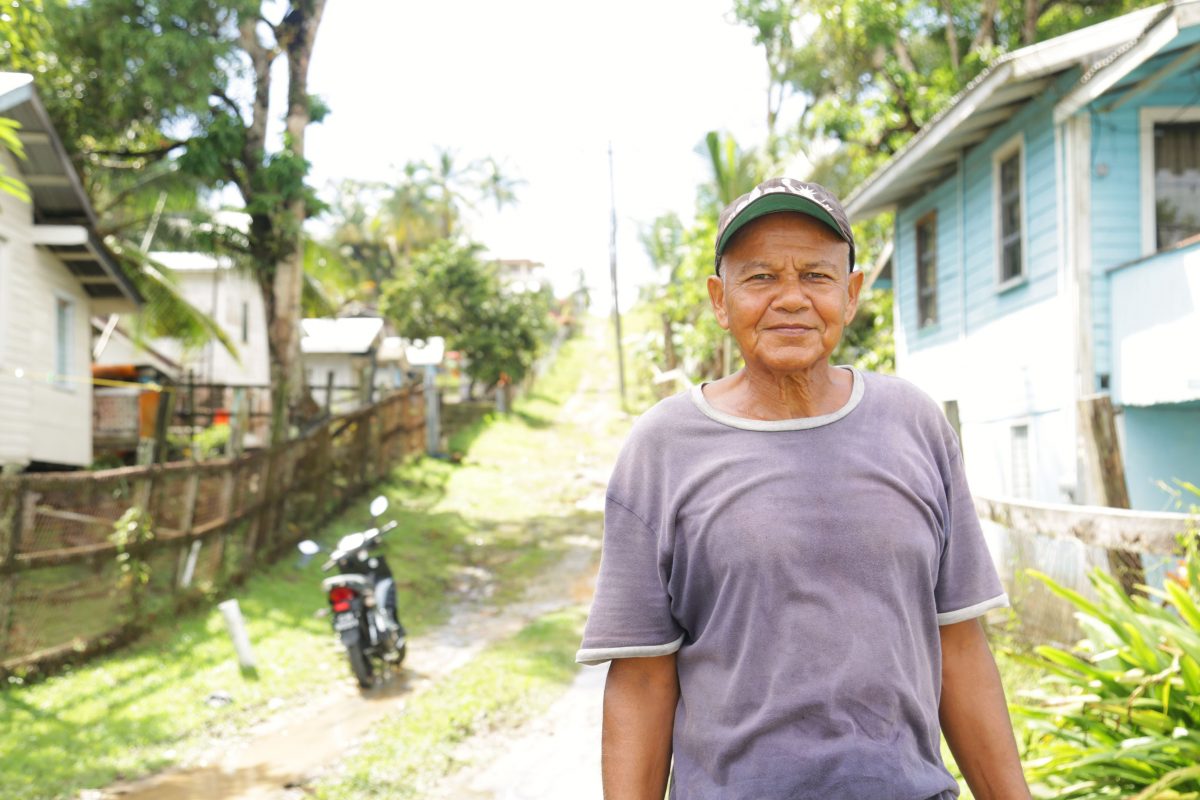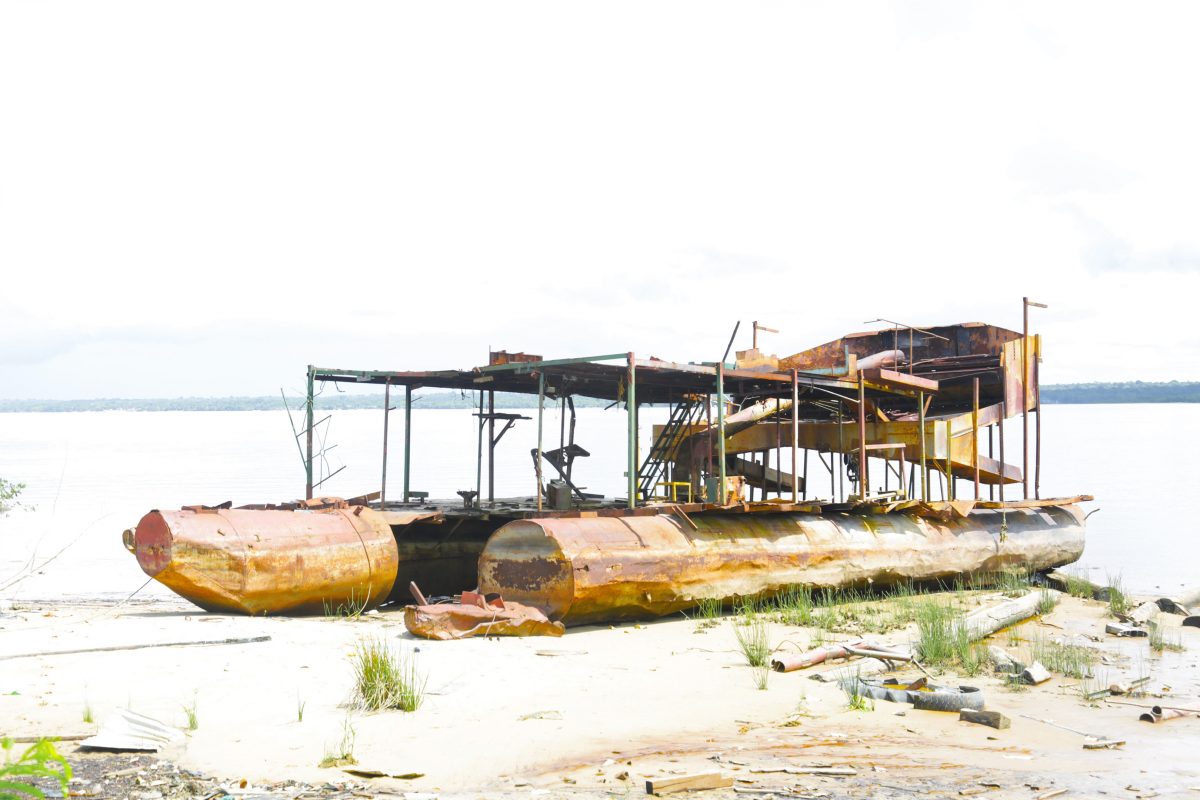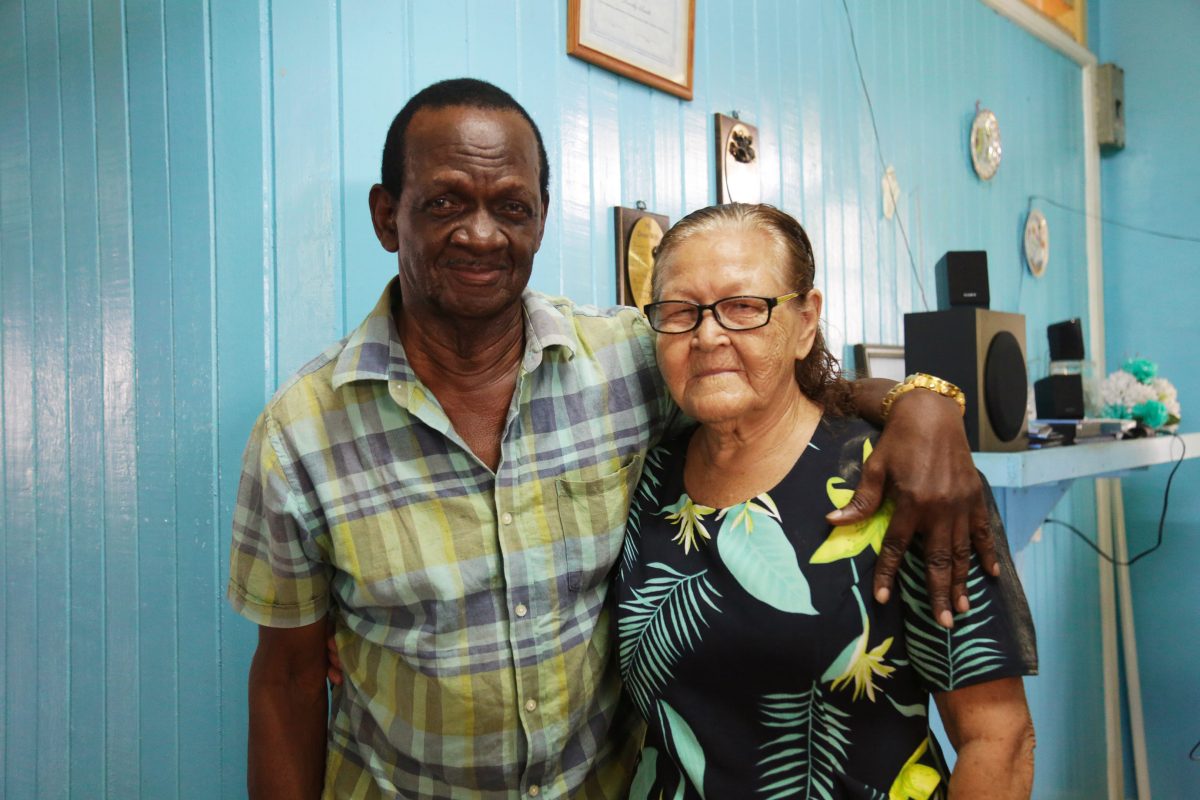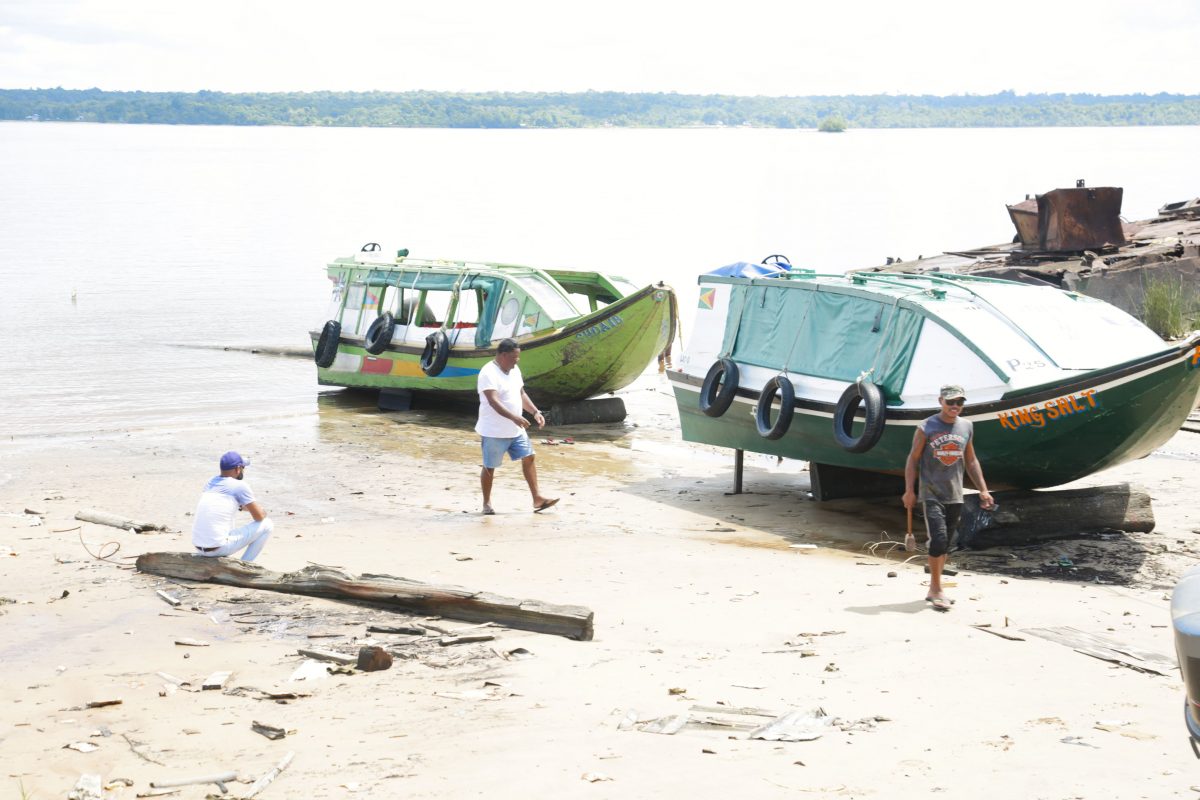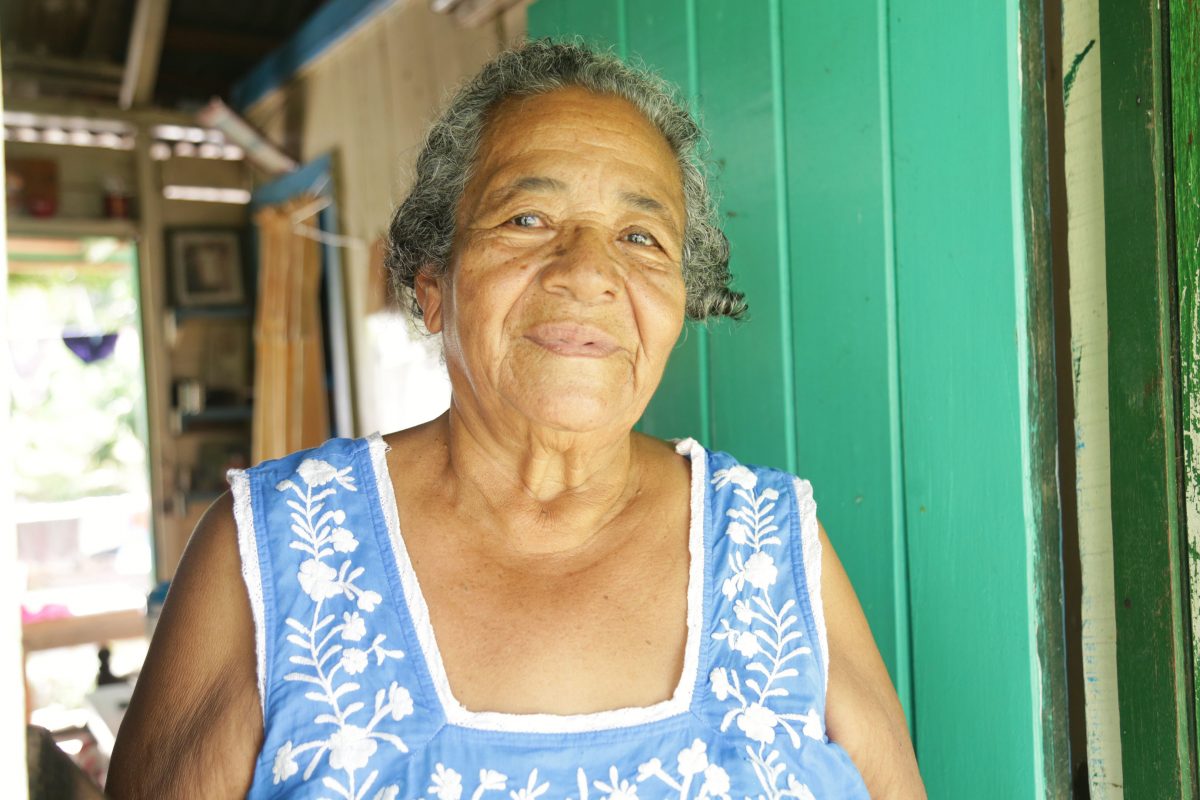Byderabo is a picturesque community on the outskirts of Bartica. Its diverse population, a large percentage of whom depend on gold mining for their livelihoods, is made up of at least five of the six Guyanese ethnicities.
On arrival I was greeted by the sight of men at work on their boats on the beach, while their friends looked on. Old rotting boats lay sunken in the sand. There are old sawmills as well, all of which add character to the scenic, hilly village.
Stella Allicock grew up among the hills playing with the children of Byderabo. “I grew up in a home where we used fireside,” she said. “We didn’t have stove and them things at that time. We normally made breakfast and lunch in the morning, so we didn’t have to cook again at lunchtime. That time we had salt fish and salt beef that we used to buy from the shop.”
Her mother prepared food like cook-up and sometimes curry with these preserved items. Chow Mein was very scarce at the time, she said, but they had it every now and then.
“My mother was Black, and my father was Amerindian, but he died since I was two years old. It was seven of us children and only me alive. I had six children of my own but two died. I have a lot of grandchildren… I can’t remember how much of them. I got great grandchildren and great-great grandchildren too. So, I live to see four generations.”
Allicock is 73 years old.
Most of her life was spent in Byderabo but there was a period of eight years when she lived in Georgetown. She returned to live in her hometown after the passing of her husband.
Asked what she liked about her village, Allicock said, “the quietness and the breeze”. This description was echoed by other residents I spoke with.
The people, Allicock said with certainty, hold her in high regard; neighbours are always calling out to her whenever they pass by, though she does not live close by the road. Some call her ‘Aunty Stella’, some ‘mommy’, others ‘granny’.
During her time of schooling, Allicock said, there were no nursery schools, but she did attend St John the Baptist Primary in Bartica. She cannot recall there being any secondary schools in her time.
Her fondest memory, Allicock chuckled, was playing pretend school where she was the teacher and the plants or sometimes stairs were her pupils. She recalled that she would beat them with whatever she could get her hands on, but because the wild cane was the most popular whip used at school, she often tried to get that. The woman explained that because she was the youngest, with her siblings much older than her, she often played alone.
Adding to her collection of memories were the times she spent swimming in the Essequibo River as a girl. Allicock boasted that she can still swim today but she is unable to climb the river defence to get to the beach as she would like. Talk of swimming led to her sharing about her son who drowned. He was 48 years old and had gone swimming in the river just outside of the Bartica Hospital when he went under.
Back in the days, she said, the river was used for all water purposes, including drinking and the water was cool and fresh to drink. Not so today as it is sometimes is mixed with saltwater from the ocean.
Allicock rarely leaves the house these days, except on two Sundays every month when she attends the Anglican Church in First Avenue, Bartica. Her daughter purchases groceries for her. She likes listening to the radio. The Merundoi radio serial drama is one of her favourite shows.
Born and raised
Andrew Newton was working on the house of a neighbour further up his street from where he lives. While he kept his hands busy with the jack he was using to raise the house, stacking wood in any open space, he glanced every now and then at the approaching clouds that threatened rain. However, as he did all of this, he still managed to talk a bit about Byderabo, where he was born and raised.
Newton spoke of his boyhood, attending St Anthony’s Roman Catholic School in Seventh Avenue, Bartica. The man explained that during his time there were no nursery schools, but he went to kindergarten at Teacher Harry’s School.
He recalled that the village was filled with trees and plants of all kinds, including coconut, star apples, coffee and legumes. They sometimes lined the roadway in the village.
“The road was just a track then. Before there was sawdust road. We had four sawmills back in the day and they [contributed] towards packing the road with sawdust. During the rainy season, the road used to be soggy like sponge,” Newton said. He could remember the names of three of the four sawmills: Nagasar Sawh’s, Rahaman’s and Rahim’s. During a period in his life, the retired seaman was employed by one of the sawmills. He believes the sawmills benefited the community in many ways.
The Nagasar Sawh Sawmill, an official from the Guyana Lands and Surveys Commission office in Bartica later said, had a shingle mill; the shingles were used for roofs of houses in and outside of Bartica.
Today, Newton lamented, there is a lack of industry for the people in Byderabo, and Bartica as well. There are many persons without jobs, though some have university degrees. Newton’s children completed their degrees at the University of Guyana. His daughter, who holds a degree in Environmental Health, waited a long time to get a job in that field before moving on to teaching although that was not her intended career.
Aside from his concerns over lack of employment, Newton is also worried about the loitering of youths, some from Bartica and other villages, outside of the town. Most of their time, he said, is spent smoking marijuana and involved in petty crimes and bigger robberies.
“It gives me great relief when I see the police patrolling the area. Their visits are sporadic,” he said, before adding that if these issues are not addressed, he fears that they will certainly lead to a time when persons live and cower in fear.
More than 50 years
Eighty-one-year-old Neville Smith was at home with Dorothy, his beautiful 85-year-old wife, who was busy in the kitchen. Born in Suddie and raised in Aurora on the Essequibo Coast, Smith was 19 years old when he left Aurora for Bartica to work along with his carpenter brother. He later moved on from carpentry and took up employment as a bulldozer operator in Wineperu.
“I liked Bartica immediately when I arrived here,” he said. “It’s breezy here despite the sunny or rainy weather. I like the sunrises here also. When me and my wife married, she was 31 and I was 28. The two of us been together for more than 50 years.”
In 1993, they migrated to the US and are now citizens. They come and go as they like but most of their visits to Guyana are often scheduled for during the North American winter season.
An avid Seventh Day Adventist, Smith visits the church in Byderabo whenever he is in Guyana.
He shared that when he is in the US there is so much to see and do, that he goes travelling all the time. He pointed out that he notices that many American products are being sold in Guyana at unreasonable prices. His Skechers sneakers, he said, cost him only US$10 but he has seen the same brand being sold here for the equivalent of US$100 or more.
Now that he is home and does not have much to do, he spends most of his time reading his bible and other church books.
Asked about the developments he wants to see in the area, Smith mentioned a more all-weather road and for the completion of the construction of the river defence along Byderabo.
